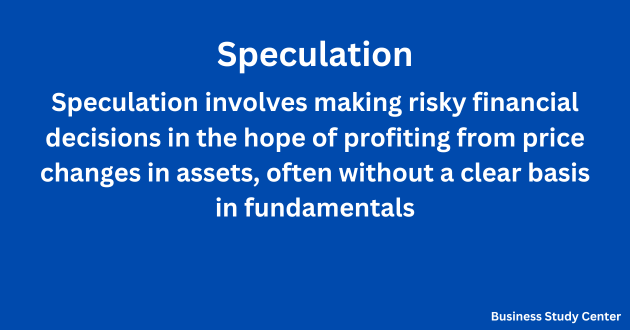
Introduction
In the realm of finance, speculation, or speculative trading, is a practice that involves engaging in financial transactions with a substantial risk of losing value, but also with the expectation of significant gains or other major rewards. Speculators are driven by the potential for substantial profits, which outweigh the risks involved. They play a crucial role in the markets by providing liquidity and absorbing excess risk. In this article, we will delve into the concept of speculation, its various forms, and its impact on different financial markets.
Understanding Speculation
Speculation revolves around trading financial instruments with high-risk characteristics, in anticipation of substantial returns. Unlike long-term investing, where the focus is on the fundamental value of an asset over an extended period, speculation emphasizes short-term price fluctuations. Speculators thrive in markets characterized by frequent and volatile price movements, playing a vital role in absorbing risk and providing liquidity when other investors hesitate to participate.
Speculation in Different Markets
Speculation and the Forex Market
The foreign exchange (forex) market is the largest and most liquid market in the world, with an estimated daily turnover of $7.5 trillion. Speculators in the forex market take advantage of the 24-hour trading availability and high-speed electronic platforms to execute trades swiftly. They engage in spot deals, options, and simple exchanges to buy and sell currency pairs, such as EUR/USD. Asset managers and hedge funds with substantial portfolios dominate this market. Speculation in the forex markets can sometimes blur the line between hedging and speculative practices.
Speculation and the Bond Market
The global bond market, valued at over $133 trillion, is influenced by interest rate movements, political uncertainties, and economic factors. Speculative trading in the bond market often revolves around price fluctuations driven by common speculation. Governments and multinational corporations issue debt securities, and their prices can vary significantly. Speculators in the bond market aim to profit from these price movements.
Speculation and Equities
Speculative trading is a significant part of the stock market, accounting for a substantial portion of daily trading volume. Speculators in equities focus on short-term price fluctuations rather than the long-term fundamental value of a company. They rely on technical analysis, market trends, and real-time news to identify potential opportunities. While speculative trading in equities offers significant profit potential, it also carries substantial risks due to market volatility and unpredictable price movements.
Is Speculative Trading Exclusive to Professionals?
Speculative trading is not limited to professionals; both amateurs and professionals can engage in it. However, it requires a certain level of knowledge, experience, and understanding of the associated risks. It is crucial to approach speculative trading with caution and develop a solid strategy. Educating oneself on market trends, technical analysis, and risk management is essential for success in speculative trading, regardless of one’s experience level.
Is Day Trading Considered Speculation?
Yes, day trading is a form of speculation. Day traders buy and sell financial instruments within the same trading day to profit from short-term price fluctuations. They aim to capitalize on intraday market movements rather than focusing on long-term investment strategies. Day traders usually close all their positions before the market closes to avoid overnight risks. Like other forms of speculation, day trading requires discipline, knowledge, and experience.
The Increase in Speculative Trading
In recent years, there has been a noticeable increase in speculative trading. Several factors have contributed to this growth:
- Technological Advancements: The rise of online trading platforms and mobile apps has made speculative trading more accessible to individual investors. These advancements have facilitated ease of trading and reduced barriers to entry.
- Lower Costs: Online brokerages have significantly reduced trading costs, including commissions and fees. This affordability has made speculative trading more attractive and attainable for individual investors.
- Access to Information: The internet and social media platforms have made it easier for investors to access financial news, analysis, and opinions. This increased accessibility to information has fueled interest in speculative trading.
- Popularity of New Asset Classes: The emergence of alternative investments, such as cryptocurrencies, has attracted many speculators seeking high returns and unique opportunities. These new asset classes have contributed to the rise in speculative trading.
Conclusion
Speculation plays a significant role in financial markets by providing liquidity, absorbing excess risk, and driving price movements. Speculators engage in high-risk trading activities with the expectation of substantial rewards. They operate in various markets, including forex, bonds, and equities. While speculative trading is not exclusive to professionals, it requires knowledge, experience, and a disciplined approach. As speculative trading continues to evolve, it is essential for investors to understand the risks involved and develop effective strategies to navigate this volatile terrain.
Disclaimer: The information provided in this article is for educational purposes only and should not be construed as financial advice. Always consult with a qualified financial professional before making investment decisions.


